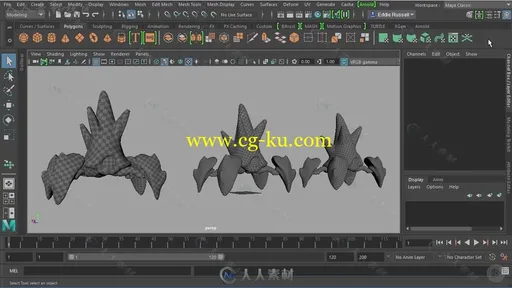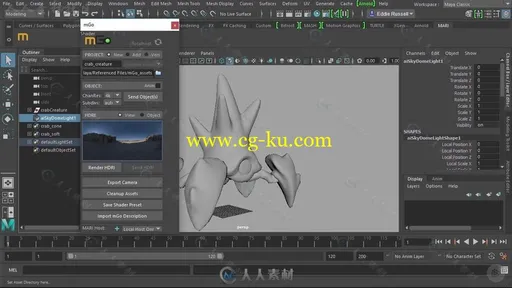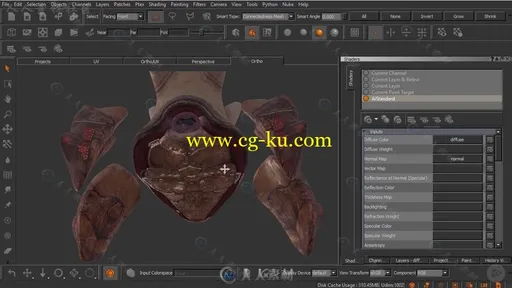本视频教程是由PluralSight机构出品的MARI与Maya高效纹理制作视频教程,时长:2小时48分,大小:2.5 GB,MP4高清视频格式,附工程源文件,教程使用软件:Mari,Maya,作者:Eddie Russell,共16个章节,语言:英语。
MARI是一款全新的具有创造性的3D纹理绘制产品,最初在Weta Digital开发,主要用来解决高细节的纹理问题,后被用于影片《阿凡达》、《第九区》等的开发制作中。MARI能够轻松处理高细节——数以万计的复杂纹理——快速且简单。MARI深受欢迎,并收到了来自各式各样的纹理绘制社区的预定请求,这其中不乏Double Negative和Framestore这样的大客户。
Autodesk Maya是美国Autodesk公司出品的世界顶级的三维动画软件,应用对象是专业的影视广告,角色动画,电影特技等。Maya功能完善,工作灵活,易学易用,制作效率极高,渲染真实感极强,是电影级别的高端制作软件。Maya声名显赫,是制作者梦寐以求的制作工具,掌握了Maya,会极大的提高制作效率和品质,调节出仿真的角色动画,渲染出电影一般的真实效果,向世界顶级动画师迈进。Maya 集成了Alias、Wavefront 最先进的动画及数字效果技术。它不仅包括一般三维和视觉效果制作的功能,而且还与最先进的建模、数字化布料模拟、毛发渲染、运动匹配技术相结合。Maya 可在Windows NT与 SGI IRIX 操作系统上运行。在目前市场上用来进行数字和三维制作的工具中,Maya 是首选解决方案。
Maya参与制作的电影有:法国国宝级艺术家Jean Giraud,他原创的影片有《第五元素》、《异形》、《星战》等,并参与制作了《沙丘魔堡》、《深渊》等经典科幻电影;导演Glenn Chaika,著名动画片导演,曾在迪斯尼担任《小美人鱼》的动画师,并执导《拇指仙童历险记》、《花木兰II》等影片;模型监制Wayne Kennedy是曾参与过《隐形人》、《星球大战》、《龙卷风》、《黑衣人》、《木乃伊》的模型师;动画监制Bob Koch和Kelvin Lee是担任《 玩具总动员》、《精灵鼠小弟》等影片的资深动画师;特效指导Manny Wong曾担任《后天》的特效总监,并参与制作了《狂莽之灾I》、《星河战舰》、《巨蟒》、《魔女游戏》等影片。
PluralSight软件开发在线教育平台是美国的一家面向软件开发者的在线教育课程服务商,Pluralsight成立于2004年;专注在线下开班式的服务,直到2008年才转向在线教育。目前Pluralsight在全球100个国家服务超过20万个用户,提供超过400个在线课程。除了个人用户外,Pluralsight还提供为企业的培训服务。Pluralsight提供的课程类型包括:C#、jQuery、iOS与Android、Java、 Ruby以及包括设计、社会化媒体、NoSQL、商业智能和Salesforce等。在收费方面,Pluralsight会收取用户每月29美元,以获取其大量关于教程的视频、文章、以及其他资料等。此外,还有一项每月49美元的服务,即可以通过线下课程接受培训。
PLURALSIGHT ESTABLISHING A TEXTURING PIPELINE BETWEEN MARI AND MAYA
MARI is a powerful, dedicated texture painting application that is used in the Film, VFX, and games industries. In addition to its robust tools for painting textures, one thing that MARI excels at is working back and forth with one of the most popular 3D packages in Maya. In this course, Establishing a Texturing Pipeline Between MARI and Maya, you’ll focus on preparing geometry for textures in Maya. First, you’ll learn about some strategies for UV layout, selection sets, and then how you can use MARI’s mGo plugin to send your assets to MARI for painting. From here, you’ll move over into MARI and first learn some basic information about projects, the user interface, navigation, and keyboard shortcuts. Once you’ve finished painting your textures, MARI provides some options for you in terms of what’s next. First, ypu’ll cover the MODO renderer inside of MARI and you’ll learn how to take renders right inside of the application. Next, you’ll learn how to quickly move your textured project back into MARI using the mGo plugin. This course will wrap up back in Maya as you learn how to work with mGo shading networks and multi-tile textures. By the time you finish this course, you should have a good understanding of how easy it is to move your Maya assets over into MARI so you can paint some amazing textures for them and then get them back into Maya. Required Software: Mari and Maya.



发布日期: 2017-6-19